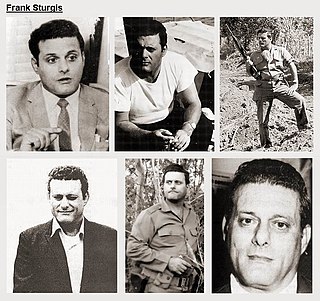
Frank Anthony Sturgis, born Frank Angelo Fiorini, was one of the five Watergate burglars whose capture led to the end of the presidency of Richard Nixon.

Ileana Ros-Lehtinen is a politician and lobbyist from Miami, Florida, who represented Florida's 27th congressional district from 1989 to 2019. By the end of her tenure, she was the most senior U.S. Representative from Florida. She was Chairwoman of the House Foreign Affairs Committee from 2011–2013. In 1989, Ros-Lehtinen won a special election and became the first Cuban American elected to Congress. She was also the first Republican woman elected to the House from Florida. Ros-Lehtinen gave the first Republican response to the State of the Union address in Spanish in 2011, and gave the third in 2014.

Santo Trafficante Jr. was among the most powerful Mafia bosses in the United States. He headed the Trafficante crime family from 1954 to 1987 and controlled organized criminal operations in Florida and Cuba, which had previously been consolidated from several rival gangs by his father, Santo Trafficante Sr.
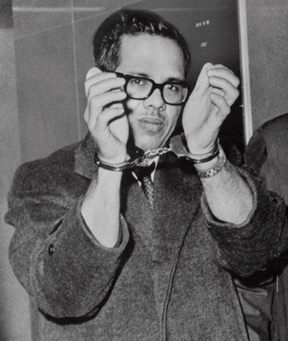
Orlando Bosch Ávila was a Cuban exile militant, who headed the Coordination of United Revolutionary Organizations (CORU), described by the United States Federal Bureau of Investigation as a terrorist organization. Born in Cuba, Bosch attended medical school at the University of Havana, where he befriended Fidel Castro. He worked as a doctor in Santa Clara Province in the 1950s, but moved to Miami in 1960 after he stopped supporting the Cuban Revolution.
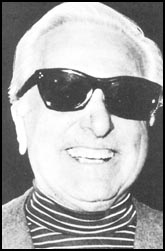
John"Handsome Johnny"Roselli, sometimes spelled Rosselli, was a mobster for the Chicago Outfit who helped that organization exert influence over Hollywood and the Las Vegas Strip. Roselli was recruited by the Central Intelligence Agency (CIA) in a plot to assassinate Cuban leader Fidel Castro.
Rolando Arcadio Masferrer Rojas, better known simply as Rolando Masferrer, was a Cuban henchman, lawyer, congressman, newspaper publisher and a political activist.

The Cuban Project, also known as Operation Mongoose, was an extensive campaign of terrorist attacks against civilians, and covert operations, carried out by the U.S. Central Intelligence Agency in Cuba. It was officially authorized on November 30, 1961 by U.S. President John F. Kennedy. The name "Operation Mongoose" was agreed to at a White House meeting on November 4, 1961.
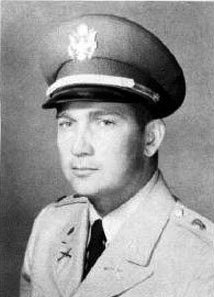
Luis Clemente Posada Carriles was a Cuban exile militant and Central Intelligence Agency (CIA) agent. He was considered a terrorist by the United States' Federal Bureau of Investigation (FBI) and the Government of Cuba, among others.

Cubana de Aviación Flight 455 was a Cuban flight from Barbados to Jamaica that was brought down on 6 October 1976 by a terrorist bomb attack. All 73 people on board the Douglas DC-8 aircraft were killed after two time bombs went off and the plane crashed into the sea. The crash killed every member of the Cuban national fencing team.
Enrique Emilio Ros y Pérez was a Cuban-American businessman, author, and activist opposed to Cuban president Fidel Castro.
The Coordination of United Revolutionary Organizations was a militant group responsible for a number of terrorist activities directed at the Cuban government following the Cuban Revolution. The United States government provided them with extensive financial and logistical support throughout their existence. It was founded by a group that included Orlando Bosch and Luis Posada Carriles, both of whom worked with the CIA at various times, and was composed chiefly of Cuban exiles opposed to the Castro government. It was formed in 1976 as an umbrella group for a number of anti-Castro militant groups. Its activities included a number of bombings and assassinations, including the killing of human-rights activist Orlando Letelier in Washington, D.C., and the bombing of Cubana Flight 455 which killed 73 people.

Ilona Marita Lorenz was a German woman who had an affair with Fidel Castro in 1959 and in January 1960 was involved in an assassination attempt by the CIA on Castro's life.
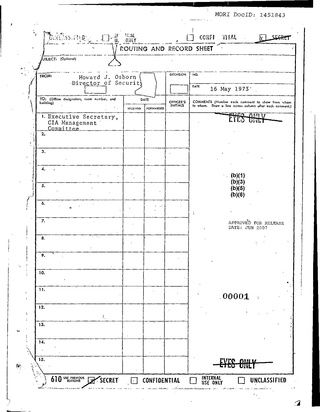
The "Family Jewels" is the name of a set of reports detailing illegal, inappropriate and otherwise sensitive activities conducted by the Central Intelligence Agency from 1959 to 1973. William Colby, the CIA director who received the reports, dubbed them the "skeletons in the CIA's closet". Most of the documents were released on June 25, 2007, after more than three decades of secrecy. The non-governmental National Security Archive filed a request for the documents under the Freedom of Information Act fifteen years before their release.

Manuel Antonio de Varona y Loredo was a Cuban lawyer and politician.
Robert Aime Maheu was an American businessman and lawyer, who worked for the FBI and CIA, and as the chief executive of Nevada operations for the industrialist Howard Hughes.
An exploding cigar is a variety of cigar that explodes shortly after being lit. Such cigars are normally packed with a minute chemical explosive charge near the lighting end or with a non-chemical device that ruptures the cigar when exposed to heat. Also known as "loaded cigars," the customary intended purpose of exploding cigars is as a practical joke, rather than to cause lasting physical harm to the smoker of the cigar. Nevertheless, the high risk of unintended injuries from their use caused a decline in their manufacture and sale.

The United States' Central Intelligence Agency (CIA) made numerous unsuccessful attempts to assassinate Cuban leader Fidel Castro. There were also attempts by Cuban exiles, sometimes in cooperation with the CIA. The 1975 Church Committee claimed eight proven CIA assassination attempts between 1960 and 1965. In 1976, President Gerald Ford issued an Executive Order banning political assassinations. In 2006, Fabián Escalante, former chief of Cuba's counterintelligence, stated that there had been 634 assassination schemes or attempts. The last known plot to assassinate Castro was by Cuban exiles in 2000.
Antonio Veciana Blanch was a Cuban exile who became the founder and a leader of the anti-Castro group Alpha 66.
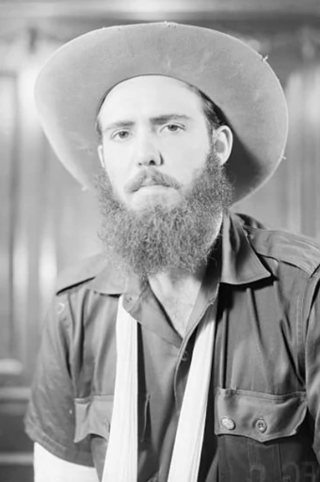
Rolando Cubela Secades was a Cuban revolutionary leader who played a vital part in the Cuban Revolution, having been a founding member of the Directorio Revolucionario Estudiantil and later the military leader of the DRE's Escambray Mountain front, achieving the rank of Commander, the highest military rank in the Revolutionary Army. After the Revolution succeeded in 1959, Cubela became Cuba's envoy to UNESCO. Under the cryptonym AM/LASH, Cubela became "an important asset" of the Central Intelligence Agency, and worked with them on plots to assassinate Fidel Castro. In 1966, Cubela was arrested for plotting the assassination of Castro, and sentenced to 25 years in prison. Released in 1979, he went into exile in Spain.
Gaspar Jiménez Escobedo was a Cuban exile living in Miami. An associate of Luis Posada Carriles, he was convicted of attempting to kidnap a Cuban consul in Mexico in 1976, for which he served 27 months in prison. He was also convicted of attempting to assassinate Cuban President Fidel Castro in Panama in 2000, and was jailed until 2004 when he was pardoned by outgoing Panamanian President Mireya Moscoso.













